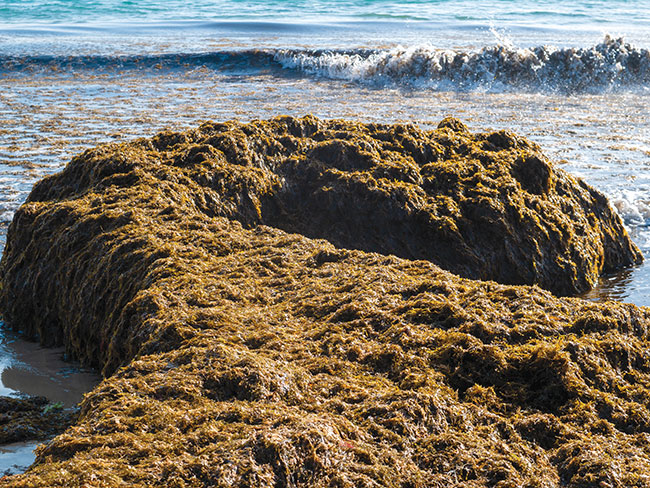
News & Views
Fish Nutrition
Research
Pre-treatment of R. okamurae enhances diet suitability in juvenile European sea bass
May 18, 2023 By Ruby Gonzalez
 The invasive algae, Rugulopteryx okamurae, is native to the Pacific Ocean, invades the strait of Gibraltar and produces natural disasters on the beaches.
Photo: Algecireño / Adobe Stock
The invasive algae, Rugulopteryx okamurae, is native to the Pacific Ocean, invades the strait of Gibraltar and produces natural disasters on the beaches.
Photo: Algecireño / Adobe Stock Pre-treatment of Rugulopteryx okamurae, a brown algae species, “significantly reduced” its side effects when used as dietary inclusion in juvenile European seabass diet, according to the study, “From invasion to fish fodder: Inclusion of the brown algae Rugulopteryx okamurae in aquafeeds for European sea bass Dicentrarchus labrax (L., 1758)”.
“We believe that R. okamurae could be a suitable resource for aquafeeds for the European sea bass, although its use requires a pre-treatment before inclusion. Otherwise, while the fish still have a positive growth performance, the gastrointestinal tract pays a toll on the integrity, transport, and inflammatory processes,” authors F. Fonseca et al. said.
The study, published on Aquaculture, was conducted in Spain. It believed that a five per cent dietary inclusion of pretreated R. okamurae biomass could be a suitable raw material for aquafeeds in the animal.
Through its research, it was confirmed that adding raw R. okarumae to aquafeeds affects intestinal process in European seabass and algal biomass enzymatic hydrolysis/ fermentation pre-treatments significantly reduce impact.
Brown algae have properties that are both beneficial and harmful as inclusions in aquafeed formulations. It has good protein and lipid content and contains bioactive compound. R. okamurae, in particular, has antimicrobial, anti-inflammatory, anti-fungal and anti-tumoral properties.
At the other end of the spectrum are the anti-herbivory properties and high fibre content in the cell wall that hinders release of potentially bioactive compounds and other nutrients.
Assuming the raw algae biomass could negatively impact animal performance, the study prepared four experimental formulations by including macroalgae material at five per cent using crude enzymatically hydrolyzed and fermented, enzymatically hydrolyzed, or fermented R. okamurae biomass, which were tested against a control feed.
While the study showed that dietary inclusion of non-treated brown seaweed still produced positive performance, it was cited that “the gastrointestinal tract pays a toll on the integrity, transport, and inflammatory processes.”
An invasive species in southern Europe, R. okamurae has been causing problems in the regions, such as bio-diversity loss, massive accumulation of biomass on shores and snagging in fishing nets.
“The sustainable use of invasive algae as an aquafeed ingredient would comply with several principles of the European Union Blue Circular Economy,” they said.
Print this page





